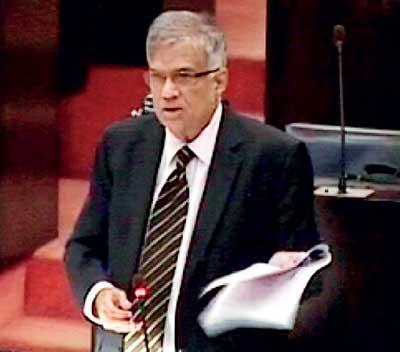Reply To:
Name - Reply Comment
President Ranil Wickremesinghe yesterday expressed confidence in creating a new financial culture and environment that had not prevailed in Sri Lanka before, through the Extended Fund Facility (EFF) programme that was approved by the International Monetary Fund (IMF) Executive Board this week.
 “… because of this agreement, financial discipline in our country will become legislated. Stringent new laws for the prevention of corruption will be introduced. A new financial culture and environment that had not prevailed previously in Sri Lanka will be created through this facility,” Wickremesinghe said delivering a special statement in Parliament yesterday.
“… because of this agreement, financial discipline in our country will become legislated. Stringent new laws for the prevention of corruption will be introduced. A new financial culture and environment that had not prevailed previously in Sri Lanka will be created through this facility,” Wickremesinghe said delivering a special statement in Parliament yesterday.
Wickremesinghe said that under the IMF programme, a new Public Finance Management bill that includes strong fiscal policies, laws, thresholds with regard to obtaining foreign loans and government securities would be drafted.
A new Central Bank, which has already been drafted, is also awaiting passage through Parliament to become law. The new law is expected to create an independent Central Bank. At the same time, Sri Lanka will become the first in Asia to have its governance come under the IMF scrutiny.
The IMF on Tuesday said it in the midst of conducting an in-depth governance diagnostic exercise, which will assess corruption and governance vulnerabilities in Sri Lanka and provide prioritised and sequenced recommendations. The report is expected to be published by September 2023.
Wickremesinghe said this assessment would allow identifying the loopholes that exist in the frameworks of Sri Lankan administration and the institutions that combat corruption.
He also said that with the IMF assistance, new anti-graft laws would be drafted, in line with the United Nations conventions.
Towards improving transparency in the country’s economic governance process, Wickremesinghe further said large-scale government procurement contracts would be made public.
“The individuals who had obtained permits to import vehicles on a concessionary tax basis along with the institutions that enjoy tax concessions/tax holidays of the Board of Investment will also be made public,” he said.
Meanwhile, Wickremesinghe drew Parliament’s attention to the IMF Board approval for the US $ 3 billion bailout being just the beginning of yet another long journey.
“We cannot simply be satisfied with only the IMF agreement. This is not the end. This is just the beginning of yet another long journey. We have to traverse that path with vigour,” he stressed.
After clinching the IMF programme, Sri Lanka now has to strike a deal with its creditors for debt treatment, which could become a very challenging task, given the country’s complicated debt mix.
“We hope to carry out the restructuring in a way that is fair to all creditors,” Wickremesinghe said.
Meanwhile, Wickremesinghe expressed confidence in completing the IMF programme in three to three and a half years. “The IMF-approved plan should be implemented and completed in four years. However, depending on our strength and determination, we should be able to finish it in three to three and a half years. Let’s give it a try. Let us put in the effort,” he said.